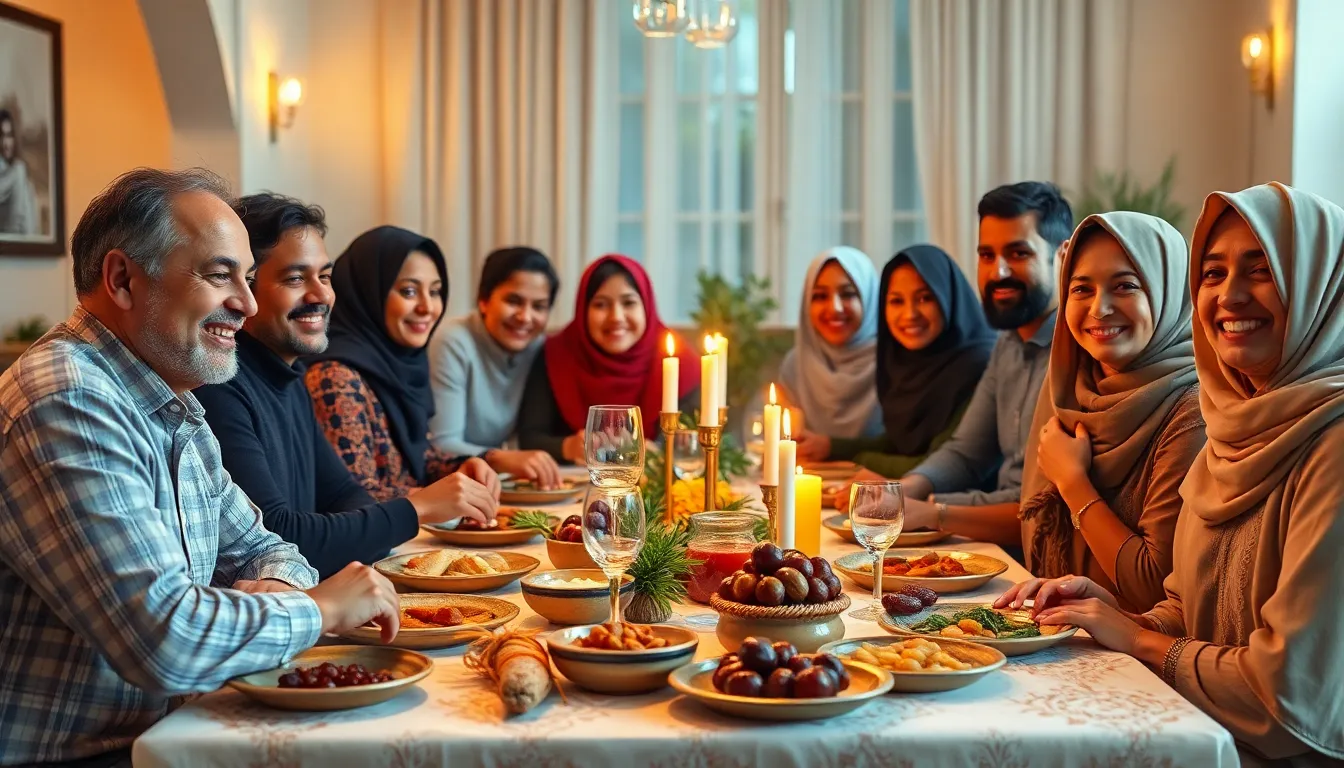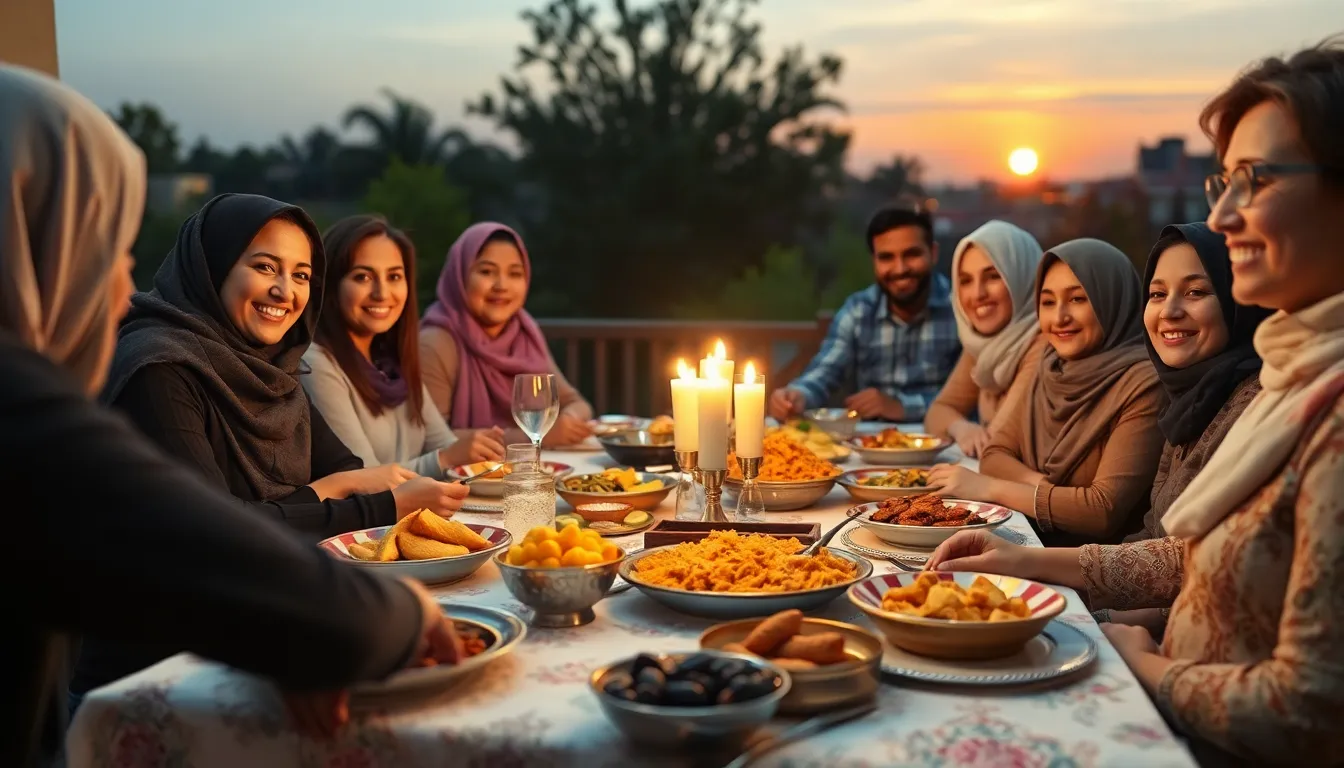As the sun sets, millions of Muslims around the world eagerly anticipate iftar, the meal that breaks their fast during Ramadan. Knowing the exact time for iftar is crucial, as it marks a moment of spiritual reflection and community gathering. With the growing significance of this daily ritual, many seek accurate and timely information to ensure they can celebrate this special moment.
In today’s fast-paced world, finding the iftar time specific to one’s location has never been easier. Whether it’s checking local prayer times or using dedicated apps, technology plays a vital role in keeping everyone connected to their faith. This article will guide readers in discovering iftar times for their area, ensuring they can observe this cherished tradition with family and friends.
Table of Contents
ToggleUnderstanding Iftar Time
Iftar time marks the moment when Muslims break their fast during Ramadan. This time is crucial as it occurs at sunset, symbolizing the end of daily fasting. Knowing the precise iftar time allows individuals to partake in the meal with family and friends, reinforcing community bonds.
Iftar schedules vary based on geographical location. Each day, sunset times shift slightly, causing iftar hours to change accordingly. Many individuals use local Islamic centers, mosques, or reliable mobile apps to determine accurate timings, providing convenience and correctness.
Factors such as season and latitude influence sunset times, resulting in variance across regions. For instance, iftar times can differ by several minutes or even hours between cities. Therefore, it’s essential to account for one’s specific location when planning the iftar meal.
In addition to exact times, cultural traditions accompany iftar meals. Some families begin with dates and water, while others may include a variety of local dishes. Understanding regional practices enhances the iftar experience, allowing participants to appreciate cultural nuances during this spiritual time.
Importance of Iftar in Ramadan

Iftar holds great importance during Ramadan, serving as a moment for spiritual reflection and community connection. This daily ritual emphasizes gratitude and the value of sharing meals with loved ones.
Spiritual Significance
Iftar marks the end of the day’s fast, symbolizing personal discipline and devotion. It allows individuals to break their fast with mindfulness, fostering a deeper relationship with their faith. Attending prayers after iftar strengthens the spiritual atmosphere, reinforcing the communal aspect of Ramadan. Many use this time for personal reflection and gratitude, enhancing their spiritual journey during the holy month.
Cultural Practices
Cultural practices surrounding iftar vary widely among communities. Families often begin their meal with dates and water, following the Sunnah of the Prophet Muhammad. Some regions incorporate traditional dishes that reflect local culinary heritage, enhancing the iftar experience. Social gatherings during iftar promote unity, with shared meals contributing to stronger community bonds. Celebratory customs often include inviting neighbors and friends, illustrating the inclusive spirit of Ramadan.
How to Determine Iftar Time Today in My Location
Knowing the iftar time for one’s location is essential for observing Ramadan practices. Individuals can determine iftar time through several reliable resources.
Local Prayer Times
Local prayer times provide a clear indication of iftar. Many Islamic centers or mosques publish daily prayer schedules, including iftar times. Websites and mobile applications, such as IslamicFinder and Muslim Pro, offer accurate prayer timings based on GPS location. By entering their city or using location services, individuals can receive real-time updates reflecting local sunset times.
Factors Affecting Iftar Timing
Several factors impact iftar timing. Variation in geographical location influences sunset hours. For example:
| City | Longitude | Latitude | Approximate Iftar Time |
|---|---|---|---|
| New York, USA | -74.0060 | 40.7128 | 7:28 PM |
| London, UK | -0.1276 | 51.5074 | 6:53 PM |
| Dubai, UAE | 55.2708 | 25.2048 | 6:44 PM |
| Jakarta, Indonesia | 106.8456 | -6.2088 | 6:11 PM |
Seasons also play a role, as sunset occurs later in summer than in winter. Moreover, cultural practices may dictate slight adjustments based on local customs and religious interpretations. Different regions may practice varying methods to announce iftar, such as using cannon fire or loudspeakers.
Incorporating these factors ensures accurate iftar timings, allowing individuals to adhere closely to the spiritual principles of Ramadan.
Tools and Resources for Iftar Time
Various tools and resources help Muslims determine iftar times accurately based on specific locations. Mobile apps and online calculators stand out as popular options.
Mobile Apps
Mobile applications provide real-time iftar timings and personalized notifications. Several noteworthy apps include:
- IslamicFinder: Features a user-friendly interface, offering precise prayer and iftar times based on location.
- Muslim Pro: Integrates an extensive database of prayer times, Quran readings, and local mosque information.
- Ramadan Legacy: Offers a comprehensive Ramadan experience, including daily prayers, iftar timings, and spiritual reflections.
These apps adapt to geographical changes, ensuring users receive accurate information throughout Ramadan.
Online Calculators
Online calculators enable users to input their location and obtain precise iftar times. Key websites that offer these calculators include:
- IslamicFinder.org: Provides an intuitive platform to check timings by entering city or postal code.
- TimeAndDate.com: Offers detailed sunset times along with Islamic prayer schedules tailored to various regions.
- MuslimWorldLeague.org: Presents a reliable iftar calculator, considering local sunset timings based on latitude and longitude.
Using these calculators ensures accurate iftar times, accommodating different cultural practices and seasonal variations.
Common Iftar Foods in Different Regions
Iftar meals feature a variety of traditional and modern foods, reflecting local customs and culinary preferences. The following sections detail some popular offerings during iftar across different regions.
Traditional Dishes
- Dates: Many cultures start iftar with dates, in line with the Sunnah of the Prophet Muhammad. Dates provide natural sugars and hydration after fasting.
- Samosas: Common in South Asia, these fried or baked pastries are filled with ingredients like potatoes, peas, or meat, making for a savory start.
- Harira: In Morocco, families often serve harira, a hearty soup filled with tomatoes, lentils, chickpeas, and spices, especially during Ramadan.
- Kebabs: In Middle Eastern countries, grilled meats, especially kebabs, serve as favorites. They pair well with flatbreads and fresh salads.
- Biryani: This spiced rice dish, with meat or vegetables, is a staple in South Asian households. It provides a fulfilling meal post-fast.
Modern Twists
- Smoothie Bowls: Many now break their fast with nutrient-packed smoothie bowls, offering fruits, yogurt, and granola, catering to health-conscious individuals.
- Vegan Variants: In response to dietary choices, vegan options like lentil salads or chickpea patties gain popularity, making traditional meals more inclusive.
- Gourmet Burgers: Fast food classics make an appearance during iftar, with gourmet burgers featuring unique toppings, allowing for a contemporary dining experience.
- Fusion Cuisine: Creative dishes, such as sushi rolls filled with traditional ingredients, offer a modern twist on classic flavors, appealing to adventurous eaters.
- Artisan Breads: Freshly baked sourdough and artisanal bread variations complement many iftar meals, providing a contemporary take on carbohydrate staples.
These food traditions enhance the experience of iftar, fostering community and enjoyment during Ramadan.
Understanding iftar time today is essential for those observing Ramadan. It not only marks the end of a day of fasting but also serves as a moment for reflection and community bonding. With the help of technology and local resources, individuals can easily find accurate timings tailored to their specific locations.
As families gather to break their fast, the diversity of cultural practices around iftar meals enriches the experience. Whether it’s sharing traditional dishes or enjoying modern culinary twists, the spirit of unity and inclusivity shines through. Embracing these practices enhances the significance of Ramadan, making each iftar a cherished occasion.





